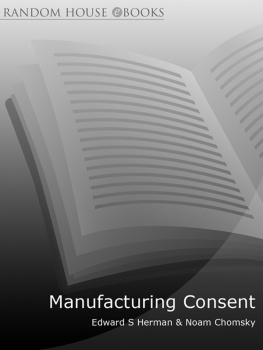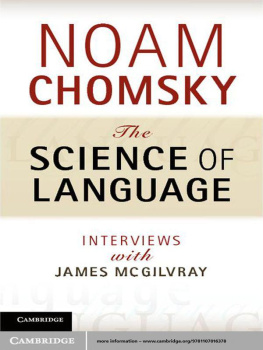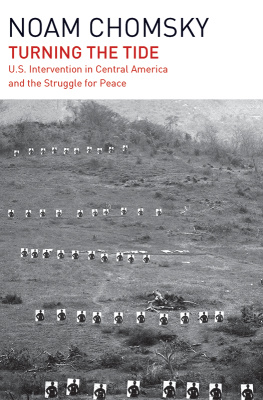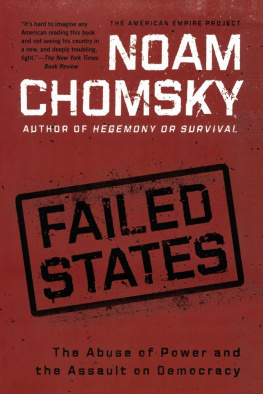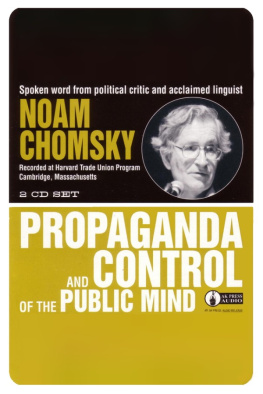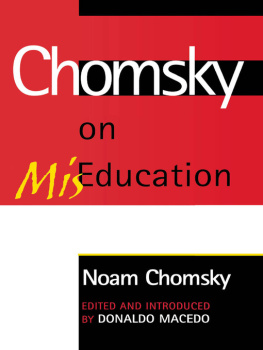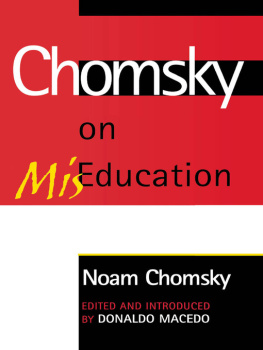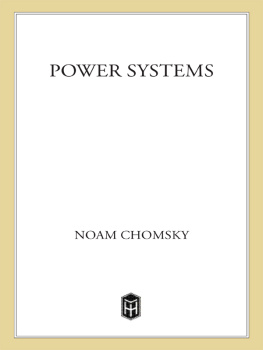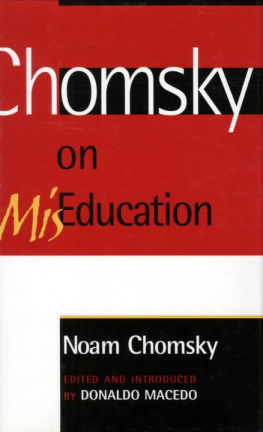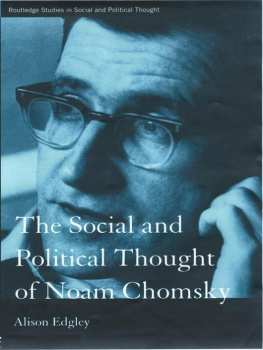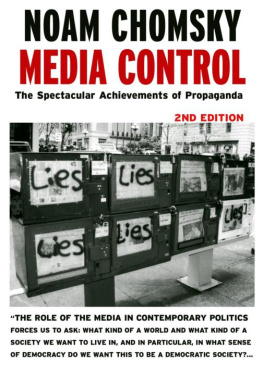The Massey Lectures Series
The Massey Lectures are co-sponsored by CBC Radio, House of Anansi Press, and Massey College in the University of Toronto. The series was created in honour of the Right Honourable Vincent Massey, former governor general of Canada, and was inaugurated in 1961 to provide a forum on radio where major contemporary thinkers could address important issues of our time.
This book comprises the 1988 Massey Lectures, Necessary Illusions, broadcast in November 1988 as part of CBC Radios Ideas series. The producer of the series was Max Allen; the executive producer was Bernie Lucht.
Noam Chomsky
Noam Chomsky is a world-renowned writer, scholar, and activist who has taught at MIT since 1955. His linguistic studies in generative and transformative grammar ushered in the Chomskyan Revolution and works such as Aspects of the Theory of Syntax earned him academic acclaim. With his anarchist-socialist views, he is considered to be among the most influential left-wing critics of American foreign policy, and has written extensively on the subjects of war, terrorism, and moral and political ideology in What Uncle Sam Really Wants, The Culture of Terrorism, Manufacturing Consent (with E. s. Herman), Media Control, 9-11, and Hegemony or Survival. These radical works have earned Chomksy equal amounts of praise, criticism, and notoriety. He has received honorary degrees from many universities worldwide, including Cambridge, McGill, the University of Toronto, Harvard, Columbia, and the University of Calcutta. He is the recipient of numerous awards and honours, such as the Distinguished Scientific Contribution Award of the American Psychological Association, the Kyoto Prize in Basic Sciences, and the Ben Franklin Medal in Computer and Cognitive Science.
NECESSARY ILLUSIONS
THOUGHT CONTROL IN DEMOCRATIC SOCIETIES
NOAM CHOMSKY

Copyright 1989 Noam Chomsky
All rights reserved. No part of this publication may be reproduced or transmitted in any form or by any means, electronic or mechanical, including photocopying, recording, or any information storage and retrieval system, without permission in writing from the publisher.
This edition published in 2003 by
House of Anansi Press Inc.
110 Spadina Avenue, Suite 801
Toronto, ON, M5V 2K4
Tel. 416-363-4343
Fax 416-363-1017
Distributed in Canada by
HarperCollins Canada Ltd.
1995 Markham Road
Scarborough, ON, M1B 5M8
Toll free tel. 1-800-387-0117
www.anansi.ca
CBC and Massey College logos used with permission
House of Anansi Press is committed to protecting our natural environment. As part of our efforts, this book is printed on Rolland Enviro paper: it contains 100% post-consumer recycled fibres, is acid-free, and is processed chlorine-free.
10 09 08 07 06 8 9 10 11 12
LIBRARY AND ARCHIVES CANADA CATALOGUING IN PUBLICATION DATA
Chomsky, Noam
Necessary illusions: thought control
in democratic societies / Noam Chomsky
Includes bibliographical references and index.
ISBN 0-88784-574-6
1. Mass media Influence. 2. Mass media Political aspects.
3. Mass media United States Influence.
4. Mass media Political aspects United States.
I. Title.
P95.8.C56 2003 302.23 C2003-900520-8
Editor: Ex Libris / Jennifer Glossop
Cover design: Bill Douglas at The Bang

We acknowledge for their financial support of our publishing program the Canada Council for the Arts, the Ontario Arts Council, and the Government of Canada through the Book Publishing Industry Development Program (BPIDP).
Printed and bound in Canada
Table of Contents
Preface
The five chapters that follow are modified versions of the five 1988 Massey lectures I delivered over Canadian Broadcasting Corporation radio in November 1988. These lectures suggest certain conclusions about the functioning of the most advanced democratic systems of the modern era, and particularly, about the ways in which thought and understanding are shaped in the interests of domestic privilege. Following these five chapters are appendices that are intended to serve, in effect, as extended footnotes amplifying some of the points raised, separated from the text so as not to obscure too much the continuity of the discussion. There is an appendix, divided into sections, for each chapter. Each section is identified by the part of the text to which it serves as an addendum. These appendices should be regarded merely as a sample. As references indicate, some of the topics touched upon in the text and appendices are explored in further detail elsewhere. Many of them merit serious research projects.
The issues that arise are rooted in the nature of Western industrial societies and have been debated since their origins. In capitalist democracies there is a certain tension with regard to the locus of power. In a democracy the people rule, in principle. But decisionmaking power over central areas of life resides in private hands, with large-scale effects throughout the social order. One way to resolve the tension would be to extend the democratic system to investment, the organization of work, and so on. That would constitute a major social revolution, which, in my view at least, would consummate the political revolutions of an earlier era and realize some of the libertarian principles on which they were partly based. Or the tension could be resolved, and sometimes is, by forcefully eliminating public interference with state and private power. In the advanced industrial societies the problem is typically approached by a variety of measures to deprive democratic political structures of substantive content, while leaving them formally intact. A large part of this task is assumed by ideological institutions that channel thought and attitudes within acceptable bounds, deflecting any potential challenge to established privilege and authority before it can take form and gather strength. The enterprise has many facets and agents. I will be primarily concerned with one aspect: thought control, as conducted through the agency of the national media and related elements of the elite intellectual culture.
There is, in my opinion, much too little inquiry into these matters. My personal feeling is that citizens of the democratic societies should undertake a course of intellectual self-defense to protect themselves from manipulation and control, and to lay the basis for more meaningful democracy. It is this concern that motivates the material that follows, and much of the work cited in the course of the discussion.
1
Democracy and the Media
Under the heading Brazilian bishops support plan to democratize media, a church-based South American journal describes a proposal being debated in the constituent assembly that would open up Brazils powerful and highly concentrated media to citizen participation. Brazils Catholic bishops are among the principal advocates [of this] legislative proposal to democratize the countrys communications media, the report continues, noting that Brazilian TV is in the hands of five big networks [while] eight huge multinational corporations and various state enterprises account for the majority of all communications advertising. The proposal envisions the creation of a National Communications Council made up of civilian and government representatives [that] would develop a democratic communications policy and grant licenses to radio and television operations. The Brazilian Conference of Catholic Bishops has repeatedly stressed the importance of the communications media and pushed for grassroots participation. It has chosen communications as the theme of its 1989 Lenten campaign, an annual parish-level campaign of reflection about some social issue initiated by the Bishops Conference.
Next page


